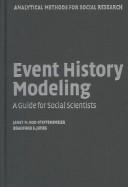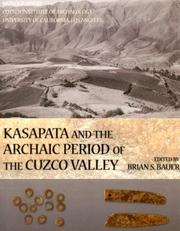| Listing 1 - 4 of 4 |
Sort by
|

ISBN: 0521837677 0521546737 0511194056 9780511194054 9780521837675 9780521546737 0511196091 9780511196096 051119479X 9780511194795 0511195435 9780511195433 9780511790874 0511790872 9786610477517 6610477515 1107150426 1280477512 0511314418 Year: 2004 Publisher: Cambridge Cambridge University Press
Abstract | Keywords | Export | Availability | Bookmark
 Loading...
Loading...Choose an application
- Reference Manager
- EndNote
- RefWorks (Direct export to RefWorks)
Event History Modeling, first published in 2004, provides an accessible guide to event history analysis for researchers and advanced students in the social sciences. The substantive focus of many social science research problems leads directly to the consideration of duration models, and many problems would be better analyzed by using these longitudinal methods to take into account not only whether the event happened, but when. The foundational principles of event history analysis are discussed and ample examples are estimated and interpreted using standard statistical packages, such as STATA and S-Plus. Critical innovations in diagnostics are discussed, including testing the proportional hazards assumption, identifying outliers, and assessing model fit. The treatment of complicated events includes coverage of unobserved heterogeneity, repeated events, and competing risks models. The authors point out common problems in the analysis of time-to-event data in the social sciences and make recommendations regarding the implementation of duration modeling methods.
Quantitative methods in social research --- Artificial intelligence. Robotics. Simulation. Graphics --- Event history analysis --- Social sciences --- History --- Evénement --- Sciences sociales --- Histoire --- Computer simulation. --- Methodology. --- Simulation par ordinateur --- Méthodologie --- Computer simulation --- Methodology --- -Social sciences --- -History --- -#SBIB:303H12 --- #SBIB:303H4 --- Annals --- Auxiliary sciences of history --- Behavioral sciences --- Human sciences --- Sciences, Social --- Social science --- Social studies --- Civilization --- Methoden en technieken: sociale wetenschappen --- Informatica in de sociale wetenschappen --- Evénement --- Méthodologie --- #SBIB:303H12 --- Historiography --- Social Sciences --- Political Science --- Event history analysis - Computer simulation --- Social sciences - Methodology --- History - Methodology
Book
ISBN: 1623493625 9781623493622 9781623493615 1623493617 Year: 2017 Publisher: College Station
Abstract | Keywords | Export | Availability | Bookmark
 Loading...
Loading...Choose an application
- Reference Manager
- EndNote
- RefWorks (Direct export to RefWorks)
The complete technical and scientific report on one of the most important shipwrecks in North American history . . . In 1995, Texas Historical Commission underwater archaeologists discovered the wreck of the La Salle's La Belle, remnant of an ill-fated French attempt to establish a colony at the mouth of the Mississippi River but landing instead along today's Matagorda Bay in Texas. For the next two years, the Commission uncovered the ship's remains under the direction of archaeologist James E. Bruseth and employing a team of archaeologists and volunteers. Amid the shallow waters of Matagorda Bay, a steel cofferdam was constructed around the site, creating one of the most complex nautical archaeological excavations ever attempted in North America and allowing the archaeologists to excavate the sunken wreck much as if it were located on dry land. The ship's hold was discovered full of everything the would-be colonists would need to establish themselves in the New World; more than 1.6 million artifacts were recovered from the site. More than two decades in the making due to the immensity of the find and the complexity of cataloging and conserving the artifacts, this book thoroughly documents one of the most significant North American archaeological discoveries of the twentieth century.
Excavations (Archaeology) --- Underwater archaeology --- Shipwrecks --- Archaeological digs --- Archaeological excavations --- Digs (Archaeology) --- Excavation sites (Archaeology) --- Ruins --- Sites, Excavation (Archaeology) --- Archaeology --- Archaeology, Submarine --- Marine archaeology --- Maritime archaeology --- Nautical archaeology --- Submarine archaeology --- Underwater exploration --- Marine archaeologists --- Marine disasters --- Wrecks --- Adventure and adventurers --- Marine accidents --- Voyages and travels --- Collisions at sea --- La Salle, Robert Cavelier, --- Cavalier, René Robert, --- Cavelier de La Salle, Robert, --- Cavelier, René Robert, --- Cavelier, Robert, --- De La Salle, Robert Cavelier, --- La Sale, --- La Salle, René Robert Cavelier, --- La Salle, --- LaSalle, Robert Cavelier, --- Salle, Robert Cavelier, --- La Belle (Frigate) --- Belle (Frigate) --- Texas --- Matagorda Bay (Tex.) --- Teksas --- Tekhas --- Tejas --- Texas (Republic) --- Texas (Province) --- Republic of Texas --- State of Texas --- تكساس --- Tiksās --- ولاية تكساس --- Wilāyat Tiksās --- Штат Тэхас --- Shtat Tėkhas --- Тэхас --- Тексас --- Техас --- Akałii Bikéyah --- Téʼsiz Hahoodzo --- Τέξας --- Πολιτεία του Τέξας --- Politeia tou Texas --- Estado de Texas --- Teksaso --- Tet-khiet-sat-sṳ̂ --- Teeksăs --- 텍사스 주 --- T'eksasŭ-ju --- 텍사스주 --- T'eksasŭju --- 텍사스 --- T'eksasŭ --- Kekeka --- Taaksaas --- טקסס --- מדינת טקסס --- Medinat Ṭeḳsas --- Texia --- Civitas Texiae --- Teksasa --- Teksasas --- テキサス州 --- Tekisasu-shū --- Tekisasushū --- テキサス --- Tekisasu --- Texas suyu --- Teksas Eyaleti --- טעקסעס --- Ṭeḳses --- Teksasos --- 得克萨斯州 --- Dekesasi zhou --- 得克萨斯 --- Dekesasi --- TX --- Tex. --- Coahuila and Texas (Mexico) --- Texas (Provisional government, 1835) --- Discovery and exploration --- French. --- Antiquities.
Book

ISBN: 9780292757219 Year: 2021 Publisher: Austin
Abstract | Keywords | Export | Availability | Bookmark
 Loading...
Loading...Choose an application
- Reference Manager
- EndNote
- RefWorks (Direct export to RefWorks)


ISBN: 9781931745345 9781931745352 Year: 2007 Volume: 52 Publisher: Los Angeles University of California
Abstract | Keywords | Export | Availability | Bookmark
 Loading...
Loading...Choose an application
- Reference Manager
- EndNote
- RefWorks (Direct export to RefWorks)
Incas --- Hunting, Prehistoric --- Excavations (Archaeology) --- Chasse préhistorique --- Fouilles (Archéologie) --- Antiquities. --- Antiquités --- Kasapata Site (Peru) --- Cuzco Region (Peru) --- Kasapata (Pérou : Site archéologique) --- Cuzco, Région de (Pérou) --- Chasse préhistorique --- Fouilles (Archéologie) --- Antiquités --- Kasapata (Pérou : Site archéologique) --- Cuzco, Région de (Pérou) --- Inca Indians --- Indians of South America --- Hunting, Primitive --- Hunting and foraging, Prehistoric --- Hunting and gathering, Prehistoric --- Prehistoric hunting --- Archaeological digs --- Archaeological excavations --- Digs (Archaeology) --- Excavation sites (Archaeology) --- Ruins --- Sites, Excavation (Archaeology) --- Archaeology --- Antiquities --- Peru
| Listing 1 - 4 of 4 |
Sort by
|

 Search
Search Feedback
Feedback About UniCat
About UniCat  Help
Help News
News